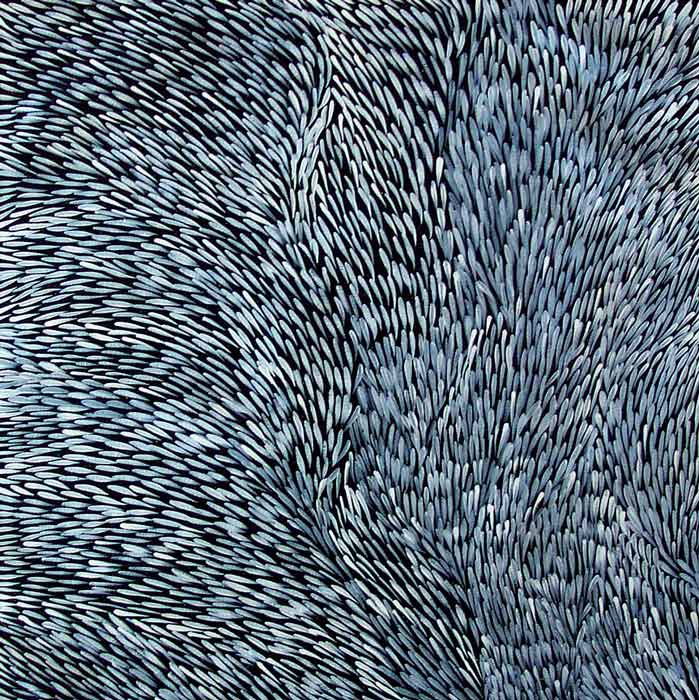Gloria TAMERRE PETYARRE - Leaves in the Wind
ADG: 4750
DescriptionCLICK HERE TO VIEW ARTIST BIOGRAPHY
Leaves in the Wind - Story of painting
This painting depicts leaves of a special bush medicine plant which is used for medicinal purposes. Women go to different places around Gloria’s country of Utopia to collect such leaves. Once selected, the leaves are boiled to extract the resin, then kangaroo fat is mixed through, creating a paste that can be stored in the bush for extended periods. The medicine is used to heal cuts, bites, burns, rashes and also acts as an insect repellent. The leaves are also dried and added to boiling water to use as an inhalant for chest conditions.
Women perform a Bush Medicine Ceremony at different times of the year and in preparation for the ceremony, the women paint their bodies with the special markings used for that particular ceremony.
Gloria TAMERRE PETYARRE - Biography
Born c.1932, Utopia Station, N.T.
Skin Name Petyarre (pronounced pi-jah-ra)
Language Group Anmayterre
Country Atnangkere
Community Boundary Bore
Region Utopia Homelands, Northern Territory
Stories Awelye (women's ceremonial body paint designs) Dreaming Stories, Arnkerrthe (Mountain Devil Lizard), Angertla (Mountain Devil Lizard Dreaming) Engcarma (Bean),Unyar(Emu), Annlara (Pencil Yam), Kadjeta (Grass Seeds), Elaitchurunga, Bush Medicine (Acacia leaves)
Gloria Petyarre is one of the seven well known artists- the ' Seven Petyarre Sisters', from the Utopia Region (Ada, Myrtle, Nancy, Kathleen, Violet and Jean Petyarre). Gloria first gained recognition as an artist working in the medium of batik, exhibiting with the Utopia Women in shows around Australia and abroad for a decade (1977-1987) before taking up the medium of canvas, painting her first work for CAAMA's Summer Project exhibition. In 1990-1991, Gloria travelled to Ireland, London and India as a representative of the Utopia women, accompanying the 'Utopia: A Picture Story' exhibition.
Gloria’s work is based on the body paint designs for her Dreamings, and shows clearly the designs painted across the women's breasts and shoulders, particularly for the Mountain Devil Lizard Ceremony. Since those early, highly distinctive works, she has developed her paintings to higher levels of abstraction, and continually experiments with line and colour. Gloria's work features on the cover of the Art of Utopia by Michael Boulter, and has been included in major survey exhibitions including 'Flash Painting' at the National Gallery of Australia in 1992, the 1991 Art Gallery of NSW touring 'Aboriginal Women's Exhibition', and in solo exhibitions. A multi-award winner, Gloria won the AGNSW Wynne Prize for landscape painting in 1999 and has been selected as a finalist four times since. Gloria’s work has featured many times in the most prominent Aboriginal art prize in the country, the Telstra National Aboriginal and Torres Strait Art Award.
Awards and Commissions
2004 Wynne Prize for Landscape Painting, Highly Commended, Art Gallery of New South Wales
1999 Winner, Wynne Prize for Landscape P
ainting, Art Gallery of New South Wales
1993 Design for tapestry for Victorian Tapestry Workshop
Collections
National Gallery of Australia, Canberra
Allen Allen and Hemsley (Allens), Sydney
Museum of Victoria, Melbourne
Museum and Art Gallery of the Northern Territory, Darwin
Powerhouse Museum, Sydney
Parliament House Art Collection, Canberra
Queensland Art Gallery, Brisbane
Westpac, New York
Gold Coast City Art Gallery, Surfers Paradise
Riddoch Art Gallery, Mt Gambier, SA
Robert Holmes à Court Collection, Perth
National Gallery of Victoria, Melbourne
British Museum, London
Singapore Art Museum
Art Gallery of New South Wales, Sydney
Art Gallery of South Australia, Adelaide
Flinders University Art Museum
Kluge-Ruhe Aboriginal Art Collection, University of Virginia
Ranking - Most Important Australian Indigenous Artists (both living and deceased)
2011 Ranked 21 /100

